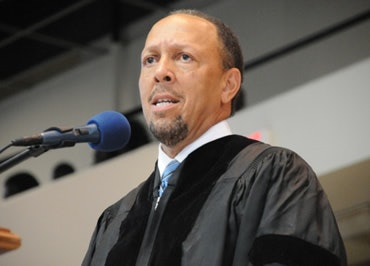 Dr. James Carmichael Renick
Dr. James Carmichael RenickAnyone who ever met Dr. Jim Renick would have found it very hard not to like him.
JR, as I called him, was a people person, and he used his affable nature quite skillfully in various settings as a mechanism to achieve his goals. In meetings with audiences that varied from student groups to faculty members to higher education policymakers, James Carmichael Renick usually emerged having achieved most, if not all, of what he wanted when he entered.
We met as participants in the American Council on Education Fellows program, longer ago than I care to specify. We bonded almost immediately, partly because of our shared experiences as African American men, but also because we felt that the academic community was complicitly supporting an entrenched system of institutional racism in America. Colleges and universities were, at best, offering lip service to the negative effects of culturally sanctioned discrimination that was pervasive throughout society. A shared mentor, Reginald Wilson, who was then director of the ACE Office of Minority Affairs, encouraged us to speak out about our concerns whenever and wherever the opportunity presented itself.
Knowing that our issues regarding racism in both the academy and the larger society would seem more credible when presented in a scholarly format, we articulated some of our thoughts in a book chapter, entitled “On the Way to Tomorrow: Institutional Racism and Black America in the Technological Society,” in Institutional Racism and Black America: Challenges, Choices, Change, edited by Mfanya Donald Tryman. Some of our comments seem prescient more than 35 years after we wrote them. For example:
“America is undergoing a period of monumental change — change that is likely to impact the lives of the majority of her citizens for the foreseeable future. Central to this change is the role played by technology.
“If the central role of technology has the effect of creating and maintaining two societies — one technologically competitive and the other technologically backwards — the implications for the future of American society are devastating. This is why questions of institutional racism and inequality must be on the agenda of the new technological age ….”
Because he was a man of action even more than he was of words, JR proceeded to make an imprint on every institution he was connected to, striving to enhance the institutional climate so that people of color were more successful in those hallowed academic settings. Shortly after concluding the ACE fellowship, he left the University of South Florida to accept a position as vice provost at George Mason University, which enabled him to hone his administrative, management and budgetary skills.
At the same time, his stature on the national front increased dramatically when he provided such inspired leadership to the Black Caucus of the American Association for Higher Education that he was elected to serve on the AAHE board. Among those who were watching this rising star were the trustees of the University of Michigan-Dearborn, who selected him to serve as chancellor of the institution.
 Dr. William B. Harvey
Dr. William B. HarveyJR surprised many people when he left the comfort and recognition of the University of Michigan system six years later to take the position of chancellor at North Carolina A&T State University (A&T). While not unhappy at UM-Dearborn, he recognized the potential that A&T offered as a larger, more complex institution, which was positioned as an historically Black university to provide a wide array of higher educational opportunities for African Americans. So, welcomed by A&T alumnus, Reverend Jesse Jackson among others, he took his talents to Greensboro, North Carolina. When he completed his service at A&T, he continued to utilize the depth of his experience and background at Jackson State University, another HBCU.
Finally, responding to a call to utilize his knowledge and insight at the national level, it seems fitting that JR closed his illustrious career by returning to ACE, this time in a position as senior vice president of the organization. But I certainly don’t want to give the impression that he was someone who worked all the time. JR was very good at having fun, especially on the golf course, and in the clubhouse he was known to call for a “pop” from time to time (his expression for a shot of single-malt scotch). Whoever coined the phrase, “they don’t make them like they used to,” must have had Jim Renick in mind. It was an honor to know him and a privilege to call him my friend.
Dr. William B. Harvey is rector of Danubius University in Romania. Dr. James Renick passed away on January 3, 2021.





















